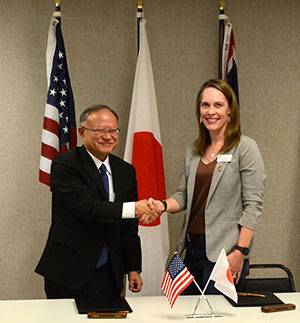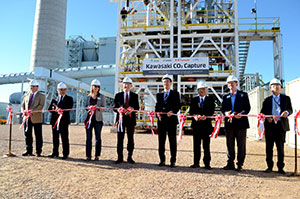JCOAL and Kawasaki Heavy Industries Collaborate With UW’s SER on Major Project
Published October 10, 2023

Japan Carbon Frontier Organization (JCOAL) and its partner, Kawasaki Heavy Industries (KHI), held a ceremony Oct. 9 to mark the construction completion of their solid sorbent capture technology at the Wyoming Integrated Test Center (ITC). The facility is adjacent to Basin Electric Power Cooperative’s Dry Fork Station near Gillette.
Speaking about the importance of global partnerships to accelerate energy research, U.S. Sen. John Barrasso provided remarks during the ceremony along with representatives of Ministry of the Environment, government of Japan (MOEJ); the University of Wyoming School of Energy Resources (SER); JCOAL; KHI; and Basin Electric Power Cooperative.
“We think of Wyoming as America’s energy breadbasket and, right here where we are in Campbell County, this is the coal capital of America,” said Barrasso, R-Wyo. “When I think of energy, I think of energy security, economic strength and environmental stewardship, and we are committed to all of those here in this center and in the state of Wyoming. To me, the answer to all of it is innovation, and the beauty of this place is that we have the best minds working together to make energy more affordable and cleaner at the same time.”
Among a select few facilities in the world, the ITC is a carbon capture and utilization test center that provides space for technology developers to evaluate technologies using actual coal-based flue gas from an operating coal-fired power plant.
“I believe it is meaningful to be able to demonstrate a separation method using a solid absorbent, which is a CO2 separation and capture technology at the ITC under the Japan-U.S. cooperation,” said Genichiro Tsukada, MOEJ director of the Climate Change Projects Office in the Climate Change Policy Division. “I hope the results of this project will lead to the practical application of CO2 separation and capture technology using solid absorbent and contribute to the further promotion of carbon capture, utilization and storage (CCUS) efforts.”
Commissioned by MOEJ, the JCOAL-KHI project broke ground at the ITC in May 2023 and is intended to demonstrate a novel CO2 separation-and-recovery technology using solid absorbents. The bench-scale demonstration also will verify the effectiveness and usefulness of the technology for commercial deployment to large-scale plants and is promising for the future of carbon capture technologies.
With equipment now fully assembled on-site, testing will begin in coming weeks and is important for the establishment of solid absorbent CO2 capture technology.
KHI hopes to contribute to achieving carbon neutrality in the world by delivering results with the carbon capture system soon and is confident that the results will lead to the further spreading of CO2 capture, says a company spokesperson.
The ceremony came on the same day SER signed a memorandum of understanding (MOU) with JCOAL to further strengthen the partnership and bolster mutual interests and benefits from applied energy research.
JCOAL and Wyoming have worked together since 2016 to cooperate in coal research, coal trade and the development of carbon capture technologies. The new partnership with SER will allow the parties to further share technical expertise and project guidance and will promote the transfer of clean coal technologies and CCUS in the U.S. and Japan.
Signed by SER Executive Director Holly Krutka and JCOAL Vice Chairperson Eiichi Harada, the MOU enables the organizations to collaborate on projects, facilitate technology development and promote efficient communication and information exchange.

“Energy challenges are complex and global in nature,” Krutka says. “The UW School of Energy Resources is honored to sign this MOU with Japan Carbon Frontier Organization as the foundation for a collaboration to work together on novel energy technologies, including carbon capture technologies being demonstrated here in Wyoming at the Integrated Test Center.”
“In view of the cruciality of sustainable climate change actions and energy security, we shall focus on our efforts to promote zero CO2 emissions technologies for coal utilization and not on coal phase-out,” says a JCOAL representative. “Establishment of CO2 separation and capture technologies as well as carbon recycling technologies are extremely important to achieve both carbon neutrality and energy security with coal utilization. For this point of view, the collaboration between the parties through an MOU is becoming increasingly important.”
About the University of Wyoming School of Energy Resources
SER facilitates interdisciplinary academic and research programs in engineering and science, economics, and environment and natural resources policy to address critical, energy-related issues. With a focus on energy-driven economic development for Wyoming, SER leads UW’s talent and resources for interdisciplinary energy research and outreach, fulfilling Wyoming’s promise to be a global leader in a thriving and sustainable energy future.
SER collaborates with stakeholders at the state, national and international levels to advance energy technologies and policies to grow and support Wyoming’s robust energy sector. The school’s research programs focus on maximizing energy production, minimizing environmental footprint and leading technology innovation to benefit the state. Through its Centers of Excellence, SER bridges the gap between academia and industry -- and ensures that the technology and policy solutions developed can be deployed.
About Japan Carbon Frontier Organization
JCOAL is committed to working toward the resolution of two critical issues for humanity: improving energy access for everyone around the world and addressing climate change. To advance these objectives, JCOAL engages in activities covering the entire coal value chain to achieve a stable energy supply, sustainable economic growth and global mitigation of environmental degradation such as CO2 emissions.
JCOAL operates under the supervision of the Ministry of Economy, Trade and Industry of Japan and is supported by more than 120-member coal-related businesses.
About Kawasaki Heavy Industries
Since its incorporation in 1896, KHI, for more than 120 years, has been developing sophisticated technologies and generating knowledge used for manufacturing products that encompass the land, sea and air sectors. These include aerospace systems; rolling stocks; marine ships; energy system and plant engineering; precision machinery and robots; and motorcycles and leisure machines.
The company aims to achieve carbon neutrality domestically through the further advancement of energy saving; the expanded use of renewable energies and waste-to-energy; and CCUS, as well as independent initiatives focused on hydrogen power generation. Additionally, since it is anticipated that many industries and companies will tackle the reduction of CO2 emissions, KHI is willing to provide these solutions to strive for early achievement of zero emissions.
About Wyoming Integrated Test Center
The ITC is a public-private partnership -- under SER’s supervision -- to foster the next generation of energy technology. The ITC allows for real-world testing at an active power plant and alleviates typical concerns of being able to transfer technology from a lab to a plant.
The facility provides space for researchers to test carbon capture and carbon utilization technologies using actual coal-based flue gas from the Dry Fork Station. The ITC is funded by the state and private industry partners Tri-State Generation and Transmission Association and National Rural Electric Cooperative Association. Basin Electric Power Cooperative is providing the host site at its Dry Fork Station as well as many additional in-kind contributions, including engineers and construction management services.

